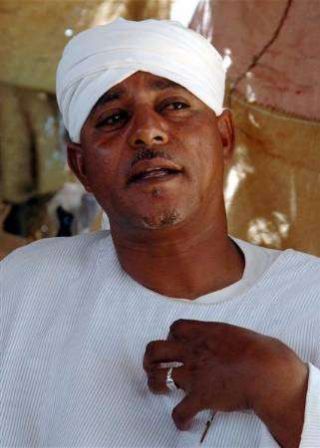Janjaweed militia leader accused over Darfur says he was acting for Sudan govt
By Philip Sherwell, The Suday Telegraph
KHARTOUM, Aug 22, 2004 — The sheikh accused by the United States of co-ordinating Janjaweed militiamen has admitted that he was “appointed” by Sudan’s government to recruit Arab tribesmen to “defend their land”.
 In an interview with The Telegraph, Musa Hilal [photo] scorned calls for his arrest on the eve of this week’s visit to Sudan by Jack Straw, the Foreign Secretary, and the United Nations’ deadline for Sudan to begin its promised crackdown on the Janjaweed.
In an interview with The Telegraph, Musa Hilal [photo] scorned calls for his arrest on the eve of this week’s visit to Sudan by Jack Straw, the Foreign Secretary, and the United Nations’ deadline for Sudan to begin its promised crackdown on the Janjaweed.
“I don’t care what my enemies say about me,” he said, jabbing his finger. “I have no concerns about being arrested. I don’t think the Sudanese government would be stupid enough to take that decision.”
Mr Hilal has been identified by the US State Department as the most senior of seven Janjaweed leaders allegedly responsible for the ethnic cleansing conducted against predominantly black African villagers by Arab militiamen in the province of Darfur.
Mr Hilal, 43, a tall man who has three wives and 13 children and leads a tribe of more than 200,000 people, denies the accusation. He was not an “agent” of the government, he said, but acknowledged allegations that the Khartoum government was using the camel and horse-riding Arab militia to suppress the rebellion.
“I am one of the tribal leaders responsible for collecting people for military service for the country,” he said, claiming that he organised his followers to defend themselves against Darfurian rebels.
“I was appointed by the government to organise people to defend their lands but legally, not illegally. They were defending themselves against the mutineers.”
Mr Straw will reinforce international pressure on Sudan’s government when he arrives in Khartoum tomorrow for meetings with President Omar al-Bashir and other high-ranking leaders.
A British official said: “He will reiterate the need for Sudan to live up to its promises. They will be told very clearly that the world is not going to forget what is going on in Darfur.” However, a senior aide to Mr Straw added that there was little appetite at the UN to follow through immediately on the threat of sanctions after the August 30 deadline imposed on Sudan.
Sudan’s government told the UN on Thursday that it will provide a list next week of Janjaweed fighters it “controls”. Although UN officials regard this as a significant concession after the Sudanese authorities spent months denying ties to the militia, they are waiting to see whether the list features the “big names”.
If Sudan does fulfil its pledge to bring militia leaders to justice, Mr Hilal – whose name is regularly mentioned in the accounts of victims of Janjaweed fighters and militia defectors – is likely to be among its most prominent targets. But for now, he appears to feel no threat from the government, after taking a prominent role in crushing last year’s rebellion in Darfur.
As if to prove that he has nothing to fear from the UN either, he chose to meet me in a British colonial-era hotel on the banks of the Blue Nile, which is also the base for Jan Pronk, the UN special envoy responsible for assessing Sudan’s response to ending the terror.
Mr Hilal batted away UN figures showing that at least one million people had fled their homes in the last year of attacks, murders and rapes. “This is all propaganda from enemies of Sudan, particularly in the West,” he said. “The number of displaced is much less.”
He also claimed that many refugees had chosen to flee their villages to improve their lives. “They find water and education and financial assistance in the camps that are not available in their villages,” he said. His claim bears no relation to the reality of life in the teeming and miserable camps across Darfur.
Mr Hilal said that he and other tribal leaders had stepped in to defend their lands against the Darfur rebels because the Khartoum government had not deployed its own troops in sufficient numbers. The men he recruited, he said, joined the police and the paramilitary Popular Defence Force, an Islamic militia created by the government to fight alongside its regular forces.
Mr Hilal’s name also appears frequently in leaked state documents obtained by Human Rights Watch, the New York-based pressure group that has chronicled links between the militia and the government.
But Mr Hilal, dressed in a white turban and green robe, became angry when asked if he belongs to the Janjaweed. “I am not Janjaweed. The Janjaweed are bandits, like the mutineers. It is we who are fighting the Janjaweed,” he declared.
Al-Zahwi Ibrahim Mailek, the information minister, said that it was for the country’s judiciary, who do not have a reputation for independence, to decide on any legal action against Mr Hilal. “If anyone has evidence against Musa Hilal, let them bring it before us,” he said. “But we cannot just arrest people because of unproven claims.”
While Mr Hilal was giving his version of events in the riverside hotel, Mr Pronk was upstairs holding meetings in the reception rooms which serve as his offices.
He told The Telegraph that Sudan’s government must show that its new security orders are being imposed on the ground. “I see political progress but I do not yet see that being translated into changes in Darfur,” he said.
Mr Pronk, who will deliver his initial report in a week’s time, said that although there had been fewer militia attacks this month, villagers were continuing to abandon their homes. “They are still fleeing because they still have reason to be afraid,” he said. “One million people don’t flee for nothing.”
